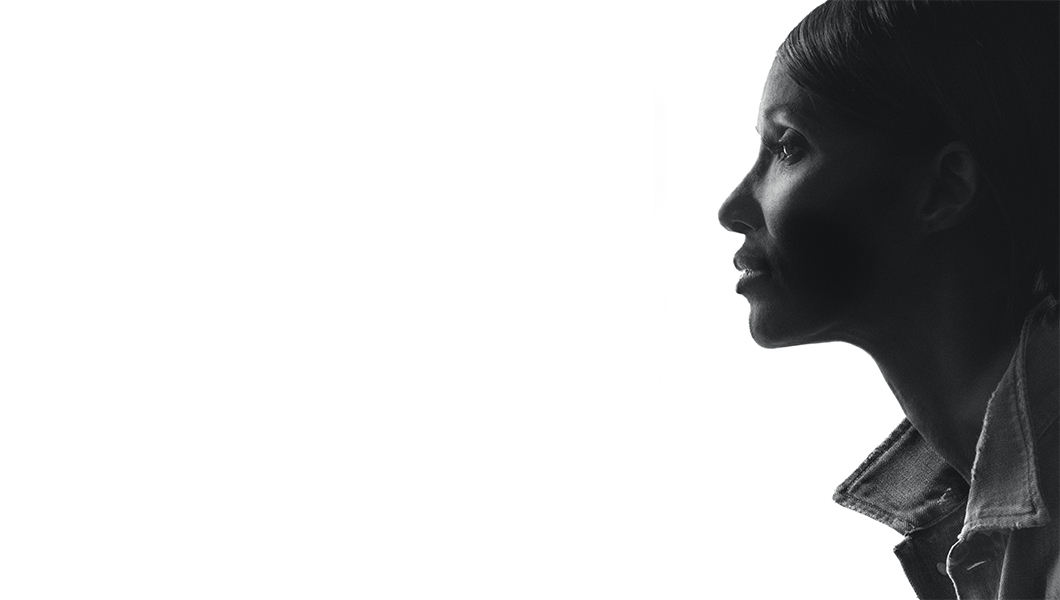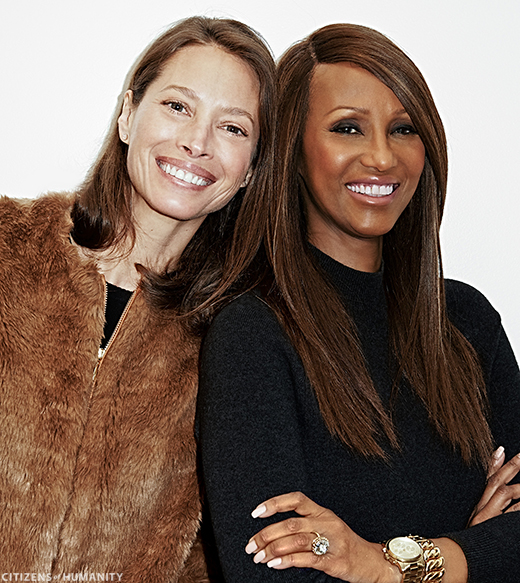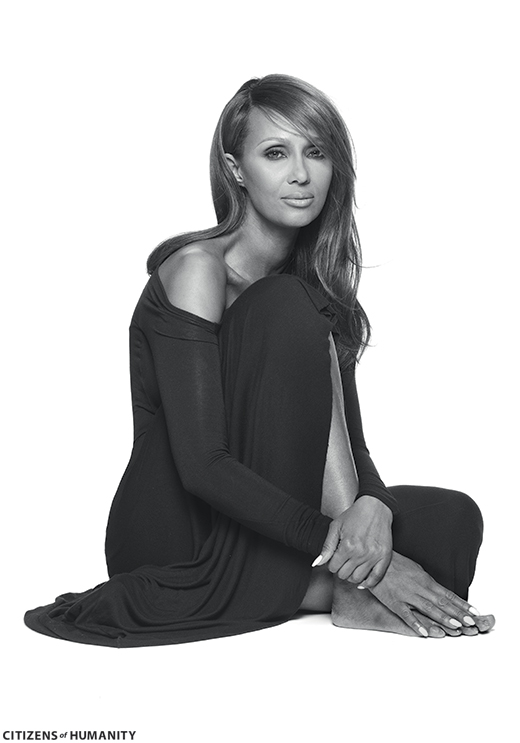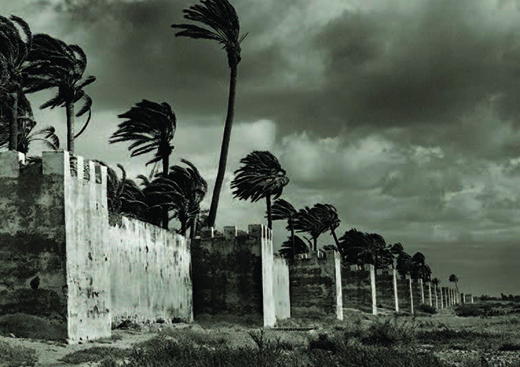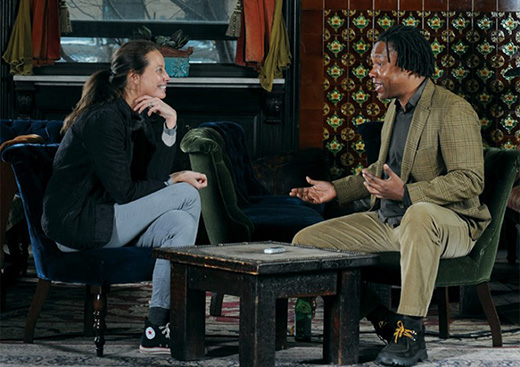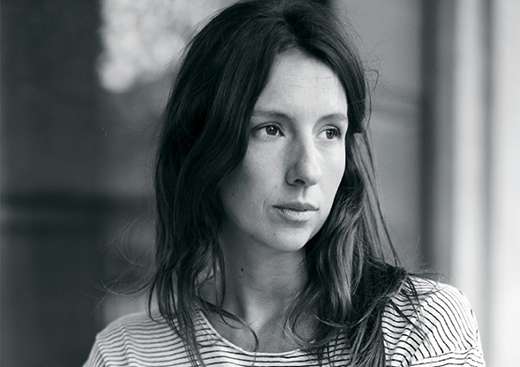CHRISTY TURLINGTON BURNS: You’ve probably thought about it more than a lot of people because you’re asked about it constantly, but how has your notion of beauty changed over the years, if at all?
IMAN: It keeps on changing. I came to the United States when I was around 18 years old in 1975. I was a student. I was more concentrated on becoming a political science student; I had never worn makeup in my life, never saw fashion magazines, and it was the last thing on my mind. Then all of a sudden I became a model—which was a complete surprise to me, because nobody had even ever said I was beautiful before. So I took it in stride, I took it as a business, because we were refugees. We left our country [Somalia]; we were living both in Tanzania and then Kenya and had to fend for ourselves. So this was an opportunity—modeling was an opportunity for me to take care of my family and my brothers and sisters, let them finish their schooling.
CTB: How long did it take you to start to see, even in the photographs of yourself, what other people were seeing?
IMAN: It took me a while. It took me really a long time, but then I found my sense of appreciation about myself. When I came here as a young girl, I was not sure about myself. My self-esteem was low.
CTB: Beauty is in the eye of the beholder, right?
IMAN: Absolutely, and let that beholder be you. The beholder has to be you, you know …
CTB: I agree.
IMAN: But it is in the eye of the beholder how they see you and how you see yourself; I always say, as I get older, the beholder becomes me.
CTB: How does that change the way you feel, when people are always saying “great shot” or telling you that you are “beautiful” all the time? Doesn’t it change the way you take that word in?
IMAN: Sometimes it’s over the top, so you don’t believe it. But then it makes the real people in your life—people you trust, you know. I tell my daughter, “You have to find people you can trust.” Because she says to me, when I say to her, “You’re beautiful,” she says, “You say that to me because you’re my mother.” But it’s very important for them to believe in themselves, because she always thinks I’ll say that because I’m Mom.
CTB: It’s funny—I call both of my children, boy and girl, “Beauty,” “Hey, Beauty” or “Good morning, Beauty” for both of them. I just thought about that now, actually, as we’re talking, it’s not in an objective way. “You’re pretty” or “Oh, you look beautiful,” but it’s just the idea that you are beauty. It’s this holistic, bigger thing: You’re kind, you’re smart, you’re all of these things.
IMAN: Absolutely, absolutely. She would say to me, “What’s so beautiful?” I’m like, it’s never about something specific. It’s not about your lips, nose, eyes. It’s not that.
CTB: It must be a really interesting experience to go through that with a teenager.
IMAN: And I have an older daughter, too.
CTB: So, how has it been?
IMAN: Different.
CTB: Yeah, tell me.
IMAN: The first time—
CTB: You were in the middle of your career, too.
IMAN: Yeah, but the times change. Nowadays, before they go to school, you try to really make some part of a human being that will know their worth, but their peers are more important to them when they become teenagers. And nowadays they’re bombarded—they’re in social media, they’re bombarded with different kinds of images. And I’m so surprised. I mean, I find the hardest job nowadays is to raise a girl, because the society is so confusing—not only about what beauty is, what body image is, and how we are celebrating women. Nowadays, nobody is ashamed of doing anything bad; they’re celebrated for it. So how do you tell somebody “That’s not right,” when the person has become a star?
CTB: Right.
IMAN: How do you? It’s so difficult. “Just look at what has happened to that person when they did that.” You can’t even say that.
CTB: I know. It’s always as if the next celebrity scandal is just a moment away. Have you had to deal with selfies with your daughter?
IMAN: Yes, I warned her about it. I said, “First of all, you know, you can’t put yourself out there, because what you will get back is not always nice.”
CTB: No, you can’t.
IMAN: I print her selfies for her.
CTB: Wow.
IMAN: I’m trying to convince her, “Now that’s a selfie!”
CTB: My niece is a senior at the same school as your daughter and my kids; there are a lot of photographers amongst her friends, and there’s a lot of nudity as well. But some incredibly artistic shots, and it’s been interesting because they’re all going to go to art college. They say, “Well, you were photographed nude.”
IMAN: You did it?
CTB: Yeah, and I regret it, honestly. Even the ones that are more artistic, I still regret.
IMAN: When my parents come, I hide them under the bed.
CTB: I have photos of people I don’t know that are nudes, beautiful nudes by Larry Clark and Irving Penn, but there’s something about… when you’re a known person or when you can recognize the person—it’s hard to be objective about it, but I told these girls, I feel terrible about it only because … I feel like I was trying to be strong in the moment, like, “Oh, I’m so free with my body,” but really, I’m not that free, you know what I mean? I wasn’t ever that comfortable.
IMAN: I did a topless shot, I think, 15 years ago, for Vanity Fair. There was a story on me and it was on the cover, so they wanted to do it again when I was 60. They asked me, “Can we do it nude?” and I said, “Absolutely not.” And it’s not because I’m older. It’s because knowing what I know now, you know what I mean?
CTB: So of all the photographers you’ve worked with, who do you think has captured you best? What’s your favorite photograph?
IMAN: I think Bruce Weber. Because Bruce captures moments. You rarely are posing for Bruce, and I have an Arthur Elgort picture that is black-and-white; you would never think it is an Arthur Elgort.
CTB: Not all smiling and jumping.
IMAN: It’s the most amazing picture—shadows in the background and the noise, the dress flying and the curls of the hair with some kind of an architectural thing. It’s one of my favorite photographs.
CTB: It’s interesting, because I feel like when there is such a body of work, there is just so much crap that we’ve done, and all those fashion shows too. When you go to Milan—well, maybe it’s different now; I haven’t even been there in 20 years.
IMAN: I haven’t done a fashion show since ’89.
CTB: I can’t go to watch them either. I have over the years every now and again, but it’s so stressful to be there when you don’t have a reason to be there. It’s just not fun and you feel like you’re in a fishbowl.
IMAN: Exactly. “What is she doing? She must be looking for a job.”
CTB: When you made that decision, how much time went into thinking about when, or did you just know one morning and say, “I’m done”?
IMAN: I woke up one morning, and I have to tell you, the Naomis and the Lindas and everything was happening at that time, so that was it for me.
CTB: But there was overlap.
IMAN: Yeah, but it was like a perfect time to exit. I literally woke up and called my agent and said, “That’s it,” and they said, “Yeah, yeah, yeah, let me call you next week, for my book.” And I said, “No, I’m done.” And I was done and I never went back.
CTB: Yeah, I had a similar thing. I thought about it for a long time, and I guess I really haven’t fully given modeling up, but in my mind I did, because I went back to school and moved on in my life. And when I went back to school, same thing. I remember somebody telling me that they were in a location van and they saw me walk by with my backpack, and they were like, “Oh, poor thing.” And I’m thinking – “Poor thing? I’m getting my education, you fools.” But I remember thinking about it. I think I had finally quit smoking and had gained some weight, and I was in Paris for the couture shows and I remember that moment when I thought, “You know what, I’m doing something healthy for myself, and they’re judging me and I don’t want to subject myself to it anymore.” And it’s such an empowering feeling when you can make that choice.
So what’s the question about beauty you hate the most? Is it, like, the aging ones?
IMAN: The aging ones. I’ve also always been … instead of trying to fight it, go with it in all the stages of your life.
CTB: Journalists are always asking the same old age questions …
IMAN: Sit.
CTB: Yeah, it’s like “Whoa.” And I just even hate the way beauty products and campaigns are selling “anti-aging.” It’s going to happen, it is happening, there is nothing we can do about it, so why are we trying to deny it? And people are surprised when you actually do embrace where you are in life, as opposed to saying “Ahh!”
IMAN: Exactly. You celebrate it. You don’t say, “Ahh, it’s freaking me out.” It doesn’t freak me out.
CTB: I was having lunch with Dayle Haddon last year …
IMAN: Oh my God, I haven’t seen her for a while.
CTB: She’s amazing. She said to me, “Oh, I feel so great in my 60s.” She said, “In my 20s, I’m trying to figure it out; my 30s, I’m starting to feel like I got it; then my 40s, I’m so busy and so tired all of the time. And then my 50s …” Is there a word that could describe who you were in each decade?
IMAN: Yes, well, I don’t know about a word.
CTB: Or a feeling.
IMAN: I would say, my 20s, even though I was in the height of my career, not as sure, self-confidence low, self-esteem low. 30s felt like … I’m aging, right? 40s, I started to own it. Funny enough, late 30s is when I met David [Bowie]. At 45, I had my daughter. Which was a miracle of delivery—no, it was a miracle conception. 40s were liberating, that I could get pregnant, that I found somebody in my life. 50 was a celebration of a half a century for me. I became very close to my older daughter. I became kinder, gentler, even to myself. I completely stopped picking on myself.
CTB: Self-acceptance.
IMAN: Yes, self-acceptance and self-celebration.
CTB: That’s amazing. We’re all just human, and sometimes we just don’t know. It’s our first time going through this, but there’s gotta be laughter and some silliness, and I think that’s what keeps us healthy and that’s what keeps us sane.
IMAN: Yeah, I know, the first time that my daughter saw me crying … she was shocked.
CTB: Like, you have feelings too?
IMAN: No, because she thinks of me as so strong. She said to me one day, “I’ll never be like you and Dad,” and I said, “It’s not about being famous.” I said, “It’s about qualities that you admire, because my mom was not famous. My mom was a nurse and became a doctor, and I always thought, ‘Oh my God, Mom. I’ll never be like her,’ ” you know? I said to her it’s not about fame, it’s qualities we like about people, and I said, “That’s what you should always surround yourself with, people you want to emulate. There is nothing better than somebody that you really admire that you want to emulate, you know. What are they doing that I like that I want to be a part of?”
CTB: That’s really what a role model is.
IMAN: But she said, “Oh, that’s like a copy.” I said, “No. Because nobody’s invented anything, it’s all passed around; we take bits and make it our own.”
CTB: I don’t remember feeling those classic adolescent feelings, maybe because I was working at such a young age. And then you kind of get thrown out of adolescence, and then you’re in our business—you’re celebrated for things that would maybe be awkward in school. It’s funny to say, but the industry got me out of feeling overly self-conscious or self-loathing. It was like, “Oh, somebody else thinks I’m good, so I’ll go with it.”
I get the best quality time with my daughter when I drive her out to Long Island to ride or go to a gymnastics meet. In the car she is more open, less distracted.
IMAN: It’s true, starting a conversation is tough, besides the “Did you do your homework?” So I said recently, “Oh, Rihanna might be going out with Leonardo DiCaprio,” so that’s how I started. She started to talk. She said, “Really? I don’t see them. Isn’t he too old for her?”
CTB: You obviously have an incredible work ethic and you’re doing so many things. How do you manage that, to be able to have the time to be there for your daughter, be a partner with your husband, you know, be all of those things that I think so many women struggle with?
IMAN: I close shop at 3:30. Done. I look at the emails after she finishes dinner and she’s doing homework. After that, every- thing is shut off.
CTB: Is it hard to do or is it easy to do for you?
IMAN: For me, it’s easy. It’s actually harder for her; she was doing fine, and then I found out she was up till 12 a.m. So now 9 p.m., everything comes out of the room.
CTB: Wow. That’s smart.
IMAN: I usually cook at home, you know, watch a movie with David after she goes to bed, so yeah. But you have to. It’s so important. You want a career? Do that first. You don’t want to have kids? Then don’t. You don’t want to get married? Then don’t. But once you do something, you got to know that there is compromise.
CTB: Yeah, someone once told me sequencing was the way to do it. You can have it all, but not at the same time.
IMAN: If you want a career, do the career first. You get married, then you have to sacrifice, and then children are coming, and then you have to sacrifice more, you know. But then I tell them, it shouldn’t shame you. If you want to have a career and you don’t want to get married, don’t, but don’t think that you can have all at the same time.
CTB: What about barriers you have overcome? What about race and religion in the industry—have you seen a noted difference in terms of representation?
IMAN: I don’t watch fashion shows, so I was not aware of it, but Bethann Hardison, one of my closest friends—she’s an activist. So one day, I get an email from her, and she says, “Do you know that they are not using any working black models in the runways anymore?” Prada hasn’t used them for six, seven years. And when the New York Times wrote about Calvin Klein, they called him the blonde leading the blonde. So all of a sudden we started to highlight this conversation; I see a lot, the politics of beauty, the politics of race. There is politics behind it. And designers were like, in the beginning, “Oh, we’re not going to be pushed around and be forced to use a black model.” Nobody’s saying this, but they say we’re not seeing black models this season, but they don’t know the harm you’re doing to the self-esteem of a young girl who is trying to get a job. So we talked about it on television and interviews on CNN, and there has been a cohesive effort by all designers.
CTB: It’s good just to have it in their consciousness, right?
IMAN: And it was very good to see that. It was so visible that the public realized, you know, and that’s very good. When it comes to me, religion, I’m Muslim, so what I’m doing is against what my religion is.
CTB: Everything about you.
IMAN: But I’m Somali; Somali is how we were raised. We never wore burkas because Somalis had our own cultures. We adopted Islam, but the world has changed. I’m always criticized by other Somalis and Muslims for what I’m doing as a model and married to a white man and all that. They all say, “You’re going to hell,” and I’m like, “Well, don’t worry about it, that will be me, why do you worry? You shouldn’t lose sleep over me. Really, please don’t worry. That will be between me and God, don’t worry about me.”
CTB: Well, once again, it’s a confidence. You know what your faith is—it’s a private thing, it’s a personal thing.
IMAN: The only opinion that I really care about is my parents’ and as I said, I have these beautiful [Irving] Penn photographs of me nude, and they go under the bed when they come.
CTB: Are you raising your daughter Muslim?
IMAN: No, she is an atheist; she doesn’t really believe in anything. So if she’s going to be, she’ll choose. She should know about everything.
CTB: Eddie [Burns] and I were both raised Catholic, but I studied comparative religion in college. I like looking at what we have in common and what’s good about all of these religions rather than what sets us apart or at odds. You want your children to be exposed to all of it and come up with it themselves, but to have something as a starting point, to question. I think atheists are really the most religious of all, because they’re questioning all the time and if you’re questioning you’re thinking about it, which makes you a much more spiritually conscious person.
IMAN: People will say all the time Islam doesn’t allow that, but that’s just not true. Extremism doesn’t allow that. There is a big difference. You have to question. Make your choice!
CTB: Well, I think we’re good, unless there’s anything that you want to say that I didn’t ask.
IMAN: No, you did very well.
—


